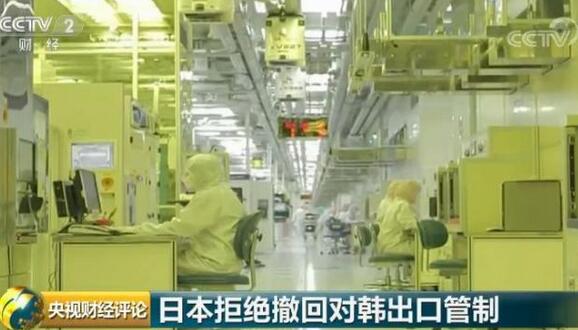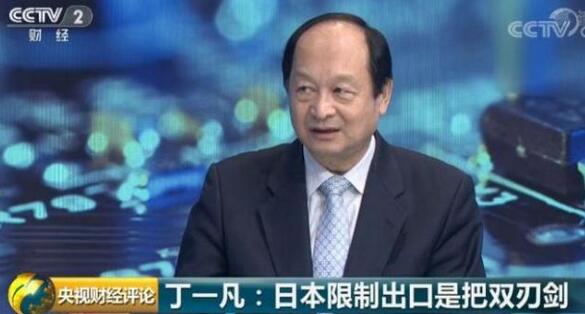CCTV News:Recently, Japan’s Ministry of Economy, Trade and Industry announced the export control of three kinds of semiconductor materials in South Korea. On July 8, South Korean President Moon Jae in made his first statement on this dispute. He urged Japan to cancel the relevant measures and negotiate with South Korea in good faith, and said that if the control brought actual losses to South Korean enterprises, South Korea would take measures to deal with it.

On July 9, the Japanese government stated that the strengthening of export control was an adjustment of domestic measures in Japan and did not belong to the scope of bilateral negotiations, so it would not consider canceling it.
The incident continues to ferment, where is the trade dispute between Japan and South Korea going? On July 9th, CCTV Financial Review invited Ding Yifan, a senior researcher of Tsinghua University National Institute of Strategic Studies, and Wang Guan, a financial commentator of Yangguang to comment.
How can friction aggravate the confrontation between Japan and South Korea?
Ding Yifan: Japanese export restrictions are a double-edged sword.

Ding Yifan, a senior researcher at the National Institute of Strategic Studies in Tsinghua University: Japan controls the export of three kinds of high-tech raw materials to South Korea. This export control is a double-edged sword. Although the supply of these raw materials is dominant in Japanese enterprises, South Korea will take corresponding measures to deal with it. Although it is more difficult, once Japanese enterprises lose this market, it will also have a certain impact on the development of Japanese enterprises.
Crown: South Korea’s economy in a downturn has been hit hard again and its counterattack is weak.
Wang Guan, financial commentator of Yangguang: South Korea’s economy is in a relatively depressed stage. In the first quarter of this year, South Korea’s GDP fell by 0.4% from the previous month, which was lower than expected, and the trade data was not optimistic. Semiconductor is the pillar industry of South Korea’s economy. After years of development, South Korea has a strong core competitiveness in this field. Last year, South Korea’s total semiconductor exports exceeded 120 billion US dollars. South Korea is weak in responding to the export control measures taken by Japan.
News link:
According to the latest survey released by the Central Committee of Small and Medium Enterprises in Korea, nearly 60% of the enterprises surveyed said that if Japan’s export control continues, it will be difficult for enterprises to operate for more than six months.
The 269 SMEs interviewed this time mainly come from manufacturing industries such as semiconductors, imaging equipment, chemistry and wireless communication equipment.
According to the statistics of Korea Trade Association, among the products imported from Korea last year, 24 categories were more than 50% dependent on Japan.
What is the impact of disputes and continuing trade disputes?
Ding Yifan: Japan and South Korea will confront or destroy the East Asian industrial chain
Ding Yifan, a senior researcher at the National Institute of Strategic Studies in Tsinghua University: The global manufacturing downturn intensified in June, and data from many parts of the world showed that trade tensions dragged down economic growth.
The economic and trade dispute between Japan and South Korea may destroy the economic industrial chain in East Asia. According to media reports, Japan is preparing to further strengthen its export control over South Korea, and the scope of its influence may be expanded, which will bring new uncertainty to the development of manufacturing industry in East Asia and also have a certain impact on the industrial chains of relevant countries.
Ding Yifan: East Asian countries are the beneficiaries of globalization. They must maintain the global value chain rather than destroy it.
Ding Yifan, Senior Research Fellow of Tsinghua University National Institute of Strategic Studies: Japan and South Korea are our close neighbors. From the perspective of Asian economic development, Japan and South Korea are the beneficiaries of economic globalization, because East Asia is closely related to the global value chain. If the economic and trade disputes between Japan and South Korea continue to ferment, it will have an impact on East Asia’s economic development. Therefore, we hope that both sides will jointly safeguard the global value chain rather than destroy it.
Crown: Asia is the "regulator" of the global economy, and the growth prospect in the second half of the year will add another cloud.

Wang Guan, financial commentator of Yangguang Finance and Economics: From a macro perspective, Asia is the "stabilizer" of the global economy. This economic and trade dispute between Japan and South Korea adds another cloud to the prospects of Asian economic growth in the second half of the year. In recent years, the Asian economy has made great contributions to global economic growth. Therefore, it is hoped that the two sides will resolve disputes through consultation and resolve disputes.
关于作者